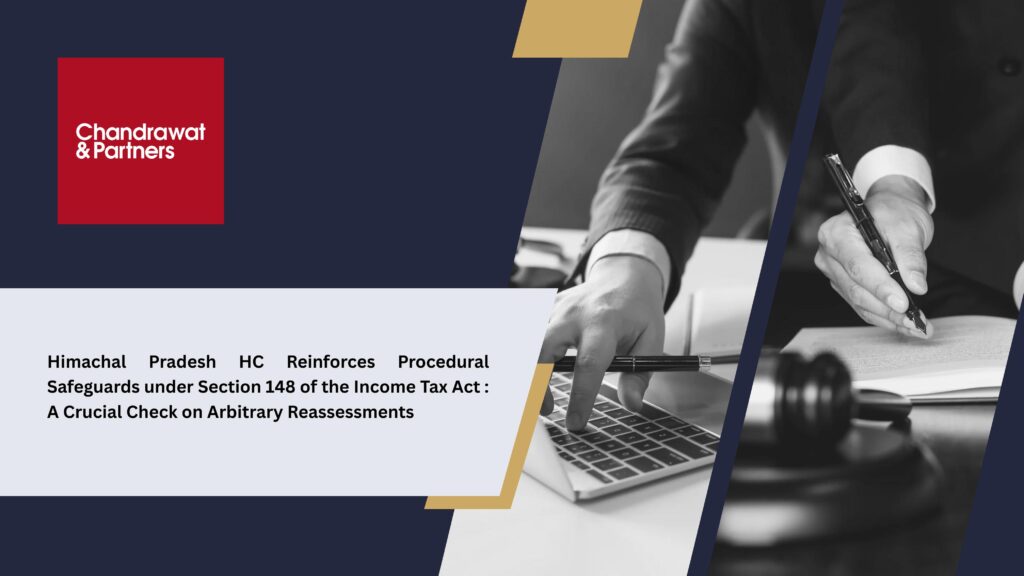Home > Recent Judgements > Himachal Pradesh HC Reinforces Procedural Safeguards under Section 148 of the Income Tax Act, 1961: A Crucial Check on Arbitrary Reassessments
Jun 03, 2025
Himachal Pradesh HC Reinforces Procedural Safeguards under Section 148 of the Income Tax Act, 1961: A Crucial Check on Arbitrary Reassessments
In a significant ruling aimed at curbing arbitrary tax reassessments, the Himachal Pradesh High Court has reiterated that notices issued under Section 148 of the Income Tax Act, 1961 must be backed by proper and justifiable reasons. This judgment underscores the judicial insistence on procedural fairness and transparency in reassessment proceedings initiated by income tax authorities.
The Legal Context: What is Section 148?
Section 148 of the Income Tax Act empowers the Assessing Officer (AO) to reopen an assessment if they have “reason to believe” that any income chargeable to tax has escaped assessment. However, this power is not absolute and is subject to the safeguards laid down in the Act and interpreted by courts over time.
The 2021 amendments to the Income Tax Act brought several procedural reforms, introducing Section 148A, which requires the AO to conduct a preliminary enquiry and offer the taxpayer an opportunity to be heard before issuing a notice under Section 148.
The High Court’s Verdict
In the case brought before the Himachal Pradesh High Court, it was argued that the notice under Section 148 was issued without recording or disclosing proper reasons as required under the law.
The Court, agreeing with the taxpayer’s contention, held that:
“A notice under Section 148 of the Income Tax Act, 1961, initiating reassessment proceedings cannot be sustained unless the Assessing Officer has clearly articulated the basis for his belief that income has escaped assessment.”
This reinforces the principle that “reason to believe” cannot be mere conjecture or vague suspicion. It must be backed by relevant material and must be clearly stated in the notice.
Implications of the Ruling
This ruling is expected to have far-reaching consequences in curbing *abuse of power* by tax authorities. The judgment:
- Upholds taxpayers’ rights by demanding transparency and accountability from the AO.
- Strengthens procedural integrity under the reassessment framework, especially in the post-2021 scenario.
- Discourages frivolous reassessment proceedings, ensuring that only genuine cases of income escapement are pursued.
Judicial Trends and Precedents
The Himachal Pradesh High Court joins a growing list of High Courts emphasizing procedural compliance in reassessment cases. The Supreme Court too, in various rulings, has stressed the need for “recording of valid reasons” as a jurisdictional prerequisite for reopening assessments.
Key Takeaways for Taxpayers and Professionals
- Demand to see the recorded reasons if served with a notice under Section 148.
- Challenge the validity of such notices if they appear vague or lack material basis.
- Stay updated with evolving jurisprudence on Section 148 and 148A, especially in light of recent legislative amendments.
Conclusion
This judgment reinforces a cardinal principle of tax law the rule of law cannot be sacrificed at the altar of revenue collection. Taxpayers must be protected from arbitrary administrative action, and tax authorities must operate within the bounds of legal propriety and due process. The Himachal Pradesh High Court’s ruling serves as a timely reminder that power, even in the realm of taxation, must be exercised judiciously and transparently.
For more information or queries, please email us at
enquiries@chandrawatpartners.com





